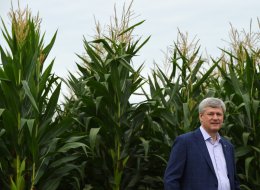 Stephen Harper’s campaign bus rolled deep into dairy country Wednesday, but farmers were disappointed he didn’t publicly address an issue on the minds of many locals: the future of supply management.
Stephen Harper’s campaign bus rolled deep into dairy country Wednesday, but farmers were disappointed he didn’t publicly address an issue on the minds of many locals: the future of supply management.
Their ranks even included the farmer who showed Harper around his new robotic milking facility and posed with the Conservative leader for a photo in an Eastern Ontario field.
A short while later, Bruce McCuaig watched as Harper delivered a speech at a campaign event in Lancaster, Ont., south of Ottawa, that made no mention of a system dairy and poultry farmers say protects their livelihoods from foreign competition.
Instead, Harper promised to spend $200 million to boost high-speed broadband Internet access in remote and rural areas.
“I was not expecting him to bring it up (at the event), but I would’ve hoped he did,” said McCuaig, owner of the 80-cow Glenmaple Farm.
“I think it’s a big concern. We’re talking about it in meetings to our MP.”
The long-running debate over the politically sensitive issue of Canada’s supply-management system, which restricts foreign access to domestic milk, cheese, eggs and poultry markets, resurfaced recently as talks heated up around the massive Trans-Pacific Partnership free-trade deal.
Reducing Canadian protectionism on imports is believed to a key concession targeted by other countries at the table.
The 12-country treaty would create the world’s largest trade zone. But domestically any move by the Canadian government to loosen the system would be delicate, particularly in rural Quebec and Ontario ahead of the Oct. 19 election.
The prospect of opening up access to the market has been met by strong opposition from farmers in some regions of the country and has even led to protests.
Federal political parties have all insisted they will continue supporting limits on dairy imports, but the Harper government agreed to open the market slightly with the recent Canada-Europe free-trade deal.
Harper has argued Canada can’t afford to be left out of the Pacific Rim treaty, which is still being negotiated.
McCuaig said he personally raised the issue during the 20-minute visit he had with Harper and his wife, Laureen.
“I’m glad I was able to bring it up with him specifically,” said McCuaig, a Conservative party member.
“I did indicate to him that margins were tight enough — even with the supply management.”
Harper responded, he said, by agreeing he would do his best to protect the interests of farmers. The prime minister acknowledged, however, that other countries were pressuring Canada to pry open the system.
“It was reassuring although he was truthful in saying they’re after us,” said McCuaig, who called meeting Harper “awesome.” The prime minister posed for photos with his family and signed his name on the cast over his daughter’s broken arm, he added.
Another Tory party member who attended Harper’s announcement and news conference was also disappointed the Tory leader came and left the riding without providing an update on the trade talks. He said some clarity might have helped ease local concerns.
“We were expecting something mentioned on that, but we didn’t hear nothing about it,” Rodney Fraser said after the event in the Stormont-Dundas-South Glengarry district, where Tory candidate Guy Lauzon is running for re-election.
“I figured there would be more mention of the (agriculture) industry and what his thoughts are for supply management, because I know there’s quite a few people here that were interested to hear his thoughts about the Trans-Pacific trade talks and stuff, but none of that was brought up.”
Fraser is a cash-crop farmer who believes his production business could benefit from access to new foreign markets, but he has concerns about his clients in the local dairy industry.
“For my customers it might not be so good, so we’re kind of in the middle,” said Fraser, who noted that he knew several people in the crowd who would’ve liked to ask Harper questions on the issue.
“How can we not be part of those talks, but at the same time you jeopardize some of your people you have, too?”
Members of the media, who are allowed just five questions per day on the Conservative tour with no chance of follow-up, did not ask Harper about supply management during the news conference.
In promising to expand high-speed broadband Internet access for rural users, Harper said there’s no infrastructure investment more critical to Canada’s economic fortunes than Internet access.
Despite the expansion of high-speed access in recent years, there remained significant gaps in some parts of the country far from major urban centres, Harper added.
Harper extolled the virtues of the Conservative record on issues of importance to rural Canada, including paying for local roads, bridges and community centres, and financial help for doctors, nurses and volunteer firefighters.
He also took well-aimed shots at Liberal rival Justin Trudeau, saying he only cares about big-city issues, like legalizing marijuana.
Source: Huffington Post









